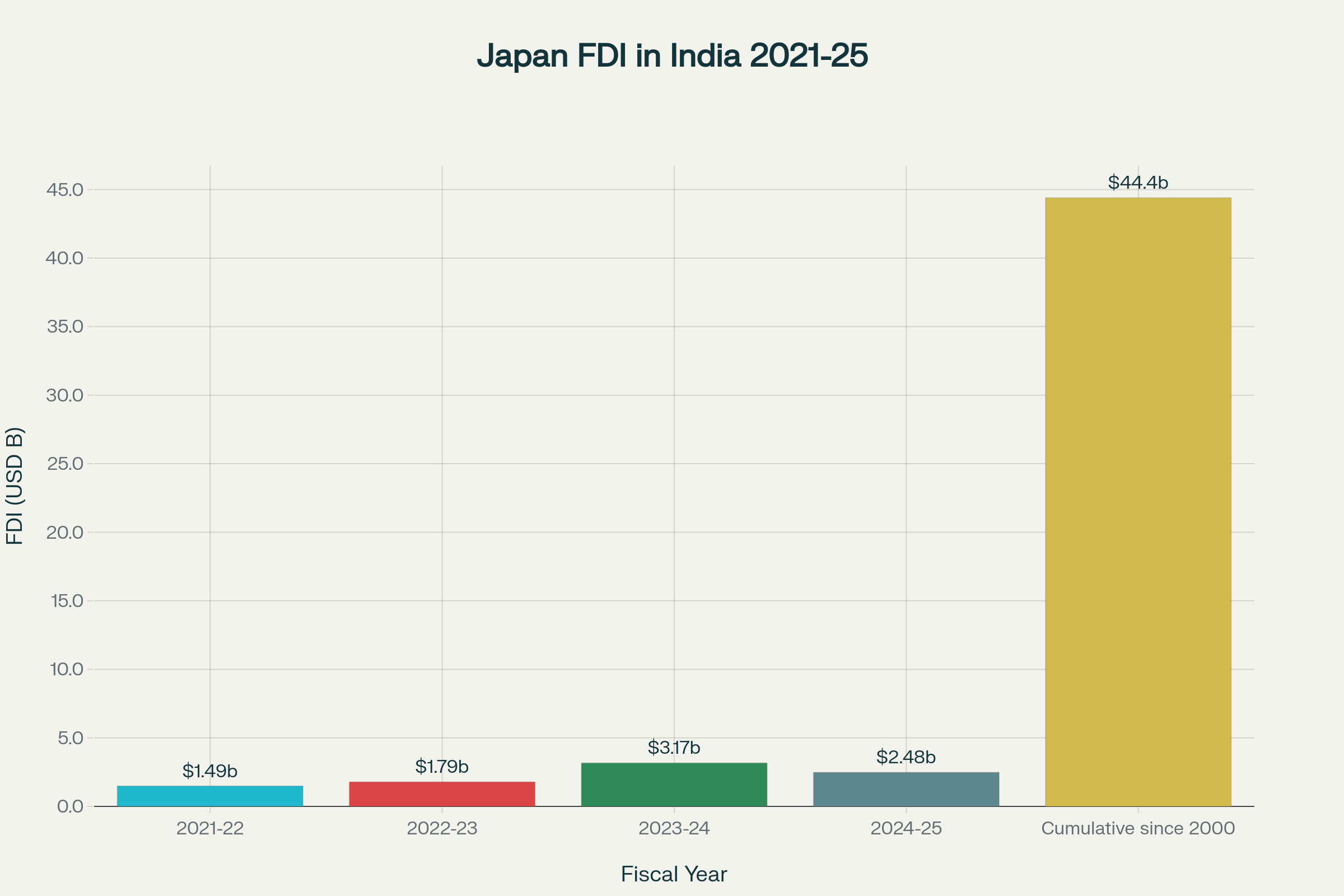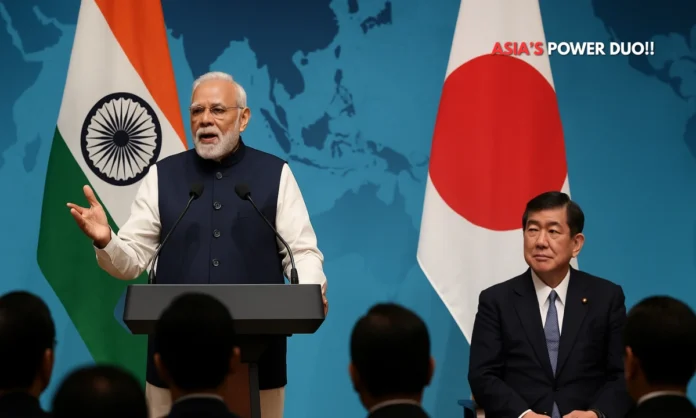Key Highlights:
- Japan commits 10 trillion yen ($68 billion) investment in India over next decade, doubling previous targets
- Modi emphasizes India’s status as world’s fastest-growing major economy positioned to become third-largest globally
- India-Japan Economic Partnership showcases bilateral trade relationship exceeding $40 billion in cumulative Japanese investments
Prime Minister Narendra Modi’s address at the India-Japan Economic Forum in Tokyo on Friday marked a transformative moment in India-Japan Economic Partnership relations, as both nations unveiled an ambitious 10 trillion yen investment roadmap spanning the next decade. Modi’s engagement with Japanese business leaders emphasized India’s role as the springboard for Japan’s expanded engagement with Global South markets, while positioning the India-Japan Economic Partnership as a cornerstone of 21st-century Asian economic integration.
The Prime Minister highlighted India’s compelling economic fundamentals, stating that “India is currently the fastest-growing major economy in the world, and very soon, it is set to become the world’s third-largest economy,” directly appealing to Japanese investors to capitalize on this India-Japan Economic Partnership momentum. Modi thanked Japanese Prime Minister Shigeru Ishiba for his support, describing Japan as “an important partner in India’s development story” and emphasizing that the India-Japan Economic Partnership represents a symbol of trust spanning from metro systems to semiconductor manufacturing.
"We've set goal of 10 Trillion Yen investment from Japan in India in next 10 yrs. Special emphasis on connecting India & Japan's small & medium enterprises and startups"
— BhikuMhatre (@MumbaichaDon) August 29, 2025
PM .@narendramodi Ji deserves abuses from Piddis? Who talks about making Bharat Rich when RAJMATA's STARVING! pic.twitter.com/ADWVstnJSM
Record Investment Commitments Drive India-Japan Economic Partnership Forward
- Japan sets unprecedented 10 trillion yen private investment target in India through 2035, doubling from previous commitments
- Cumulative Japanese FDI reaches $44.4 billion since 2000, establishing Japan as fifth-largest investor in India
The centerpiece of Modi’s Tokyo visit was Japan’s commitment to 10 trillion yen ($68 billion) in investment over the next decade, representing the largest bilateral investment pledge in India-Japan Economic Partnership history. This ambitious target doubles the previous 5 trillion yen commitment made during Prime Minister Kishida’s 2022 visit, demonstrating Japan’s growing confidence in India’s economic trajectory. Modi emphasized that this investment target places “special emphasis on connecting India’s and Japan’s small and medium enterprises and startups,” expanding the India-Japan Economic Partnership beyond traditional large-scale projects to include grassroots business cooperation.
Japanese Prime Minister Ishiba recognized the immense potential for Japanese companies to deepen supply chain integration in India while requesting continued regulatory reforms. Recent data shows Japanese FDI flows demonstrating sustained growth, from $1.49 billion in 2021-22 to $3.17 billion in 2023-24, reflecting the strengthening foundation of the partnership. The cumulative Japanese investment of $44.4 billion since 2000 positions Japan as the fifth-largest source of foreign direct investment in India, underscoring the mature state of the India-Japan Economic Partnership.

Technology Innovation Becomes Central to Enhanced Cooperation
- AI Cooperation Initiative and Digital Partnership 2.0 launched to strengthen technology collaboration
- Semiconductors, critical minerals identified as top priorities for bilateral cooperation
Modi’s Japan visit elevated technology cooperation to the forefront of the bilateral agenda, with both leaders launching comprehensive initiatives in artificial intelligence and digital technologies. The Prime Minister emphasized that “Japan’s technology and India’s talent can together lead the tech revolution of this century,” positioning the India-Japan Economic Partnership as a catalyst for global innovation leadership. The newly announced AI Cooperation Initiative focuses on large language models, data centers, and AI governance, while Digital Partnership 2.0 promotes joint collaboration in emerging technologies through startup partnerships and corporate cooperation.
Modi specifically highlighted that “semiconductors and rare earth minerals will be at the top of our agenda,” identifying these critical sectors as priorities for expanded collaboration. Japanese companies are increasingly integrating Indian suppliers into global value chains, particularly in semiconductor and advanced manufacturing sectors, strengthening the technological foundation of the India-Japan Economic Partnership. The partnership extends to space cooperation, with Modi welcoming the agreement between ISRO and JAXA for the Chandrayaan-5 mission, stating that “our active cooperation will cross the boundaries of the earth and become a symbol of humanity’s progress in space”. This comprehensive technology focus demonstrates how bilateral cooperation is evolving beyond traditional trade relationships toward cutting-edge innovation collaboration.
Infrastructure Development Showcases Partnership Maturity
- Mumbai-Ahmedabad high-speed rail project exemplifies successful technology transfer cooperation
- Next-generation mobility partnership expands to ports, aviation, and shipbuilding sectors
Infrastructure cooperation represents a cornerstone of the evolving bilateral relationship, with Modi highlighting the Mumbai-Ahmedabad high-speed rail project as a flagship example of successful collaboration. The Prime Minister noted that “with Japan’s cooperation, work is underway on the Mumbai-Ahmedabad high-speed rail project,” demonstrating how the India-Japan Economic Partnership facilitates large-scale technology transfer and infrastructure development. Modi emphasized India’s remarkable infrastructure progress, stating that “in the last decade, India has made unprecedented progress in next-gen mobility and logistics infrastructure” with port capacities doubling, creating enhanced connectivity that benefits the broader bilateral relationship.
The next-generation mobility partnership under the framework now extends beyond railways to include cooperation in ports, aviation, and shipbuilding sectors. Modi expressed confidence that “Japanese technology and Indian talent are a winning combination,” highlighting how infrastructure projects serve as platforms for broader economic cooperation. The defense and space sectors have been opened to private participation, followed by recent liberalization of the nuclear energy sector, creating new avenues for India-Japan Economic Partnership expansion. Japanese companies are particularly focusing on sustainable infrastructure investments that align with India’s clean energy goals, including the joint credit mechanism for green financing that Modi described as demonstrating how “India’s green partnership is as strong as its economic partnership”.
Policy Environment Strengthens Bilateral Foundation
- Parliament approval of simplified tax regime creates favorable investment climate for Japanese businesses
- Nuclear energy sector opening to private investment expands cooperation opportunities
Modi’s Tokyo engagement emphasized India’s commitment to creating an enabling environment for expanded India-Japan Economic Partnership through comprehensive policy reforms. The Prime Minister announced that “a few weeks ago, our Parliament approved a new and simplified tax regime,” directly addressing Japanese business concerns about regulatory complexity and strengthening the bilateral framework. Modi’s signature “reform, perform and transform” approach was highlighted as the driving force behind India’s economic transformation, with the Prime Minister declaring that “the world is not just watching India, it is counting on India”.
The improved regulatory environment has contributed to India’s enhanced credit ratings and political stability, creating a more predictable business climate that benefits India-Japan Economic Partnership initiatives. Modi specifically mentioned opening the nuclear energy sector to private investment, stating that “after the defence and space sectors, we are also opening the nuclear energy sector for the private sector,” creating new opportunities for partnership development.
The Prime Minister’s appeal to Japanese investors was direct and compelling: “Come, make in India and make for the world,” emphasizing India’s role as a manufacturing hub for global markets under the bilateral framework. Both leaders emphasized that economic cooperation is rooted in shared democratic values and mutual trust, with Modi noting that “strong democracies are natural partners in shaping a better world”.
Final Perspective on Strategic Partnership Evolution
Modi’s Japan visit represents a defining moment in India-Japan Economic Partnership relations, with the 10 trillion yen investment commitment marking the largest bilateral economic pledge in the partnership’s history. The comprehensive nature of agreements spanning technology, infrastructure, manufacturing, and policy reforms demonstrates how bilateral cooperation has evolved into a strategic alliance that extends far beyond traditional trade relationships. Modi’s positioning of India as the “springboard for Japanese business to the Global South” establishes the India-Japan Economic Partnership as a template for broader Asian economic integration and South-South cooperation.
The emphasis on connecting small and medium enterprises, startups, and fostering people-to-people exchanges shows how the partnership is becoming deeply embedded in both nations’ economic ecosystems. The decade-long roadmap with its focus on investment, innovation, economic security, and sustainable development positions the India-Japan Economic Partnership as a cornerstone for both nations’ future prosperity and a model for strategic economic cooperation in the Indo-Pacific region.


